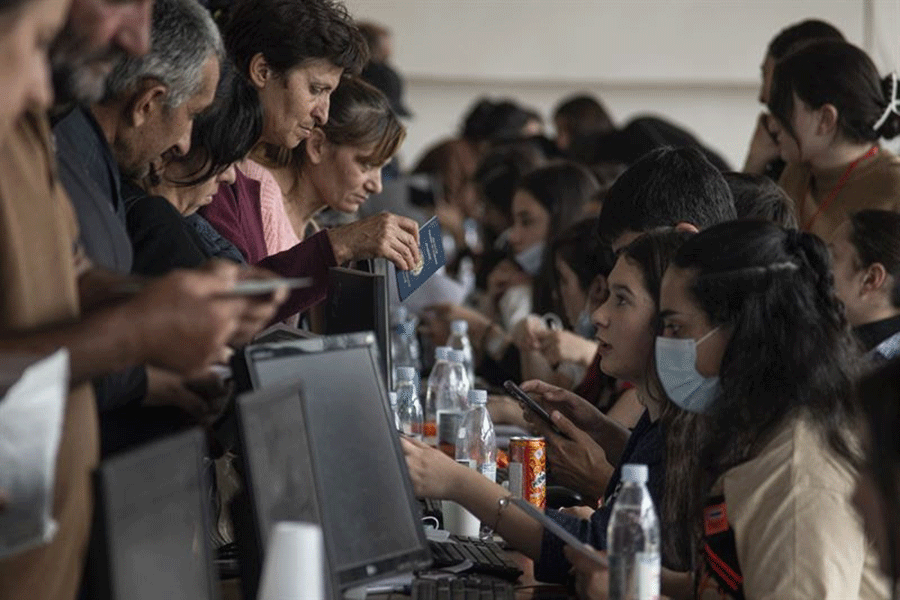WHO intensifies support to Armenian Ministry of Health at this critical time
In less than a week, well over 100,000 ethnic Armenians from Nagorno-Karabakh – almost the entire estimated population of the territory – have poured into neighbouring Armenia, triggering a humanitarian crisis with acute health needs. WHO is working urgently to support the Ministry of Health of Armenia, under the wider government-led response, both now and in the months ahead.
“As the exodus began, I swiftly deployed my Special Envoy Robb Butler to help assess the situation and strategize with the Armenian Ministry of Health on a comprehensive health emergency plan. We have already mobilized health supplies and international expertise to assist a health system dealing with a sudden, massive influx of refugees, many of whom have specific medical needs,” noted Dr Hans Henri P Kluge, Regional Director of the WHO Regional Office for Europe.
“WHO had already pre-positioned trauma supplies to Armenia. Following the dramatic explosion of a fuel depot along the route taken by those entering Armenia, WHO is dispatching burns kits to support the advanced care need for severe burns patients. To support the general health needs of the displaced population, WHO is also sending medicines for non-communicable diseases, that will cover 3 months of treatments for up to 50,000 persons.
Read also
“We’ve activated our emergency systems and will be sending experts to the country across a range of disciplines including mental health, burns management, essential health services, and emergency coordination following a full assessment of the needs. The challenges are truly enormous, and we’re there to do all we can.”
Robb Butler, the Regional Director’s Special Envoy, has met with Minister of Health Anahit Avanesyan to reiterate WHO’s full and unwavering support. Based on his discussions and field mission to a critical refugee registration point, WHO/Europe and WHO/Armenia have agreed with the Ministry of Health on the following:
- Immediately mobilizing burns experts from Israel, Belgium and Lebanon, and supplies to treat the injured;
- Assessing and addressing the refugees’ immunisation needs;
- Deploying a mental and psychosocial health team;
- Setting up modular prefabricated clinics in remote areas; and
- Supporting the government to integrate health workers, including – so far – almost 300 doctors and 1200 nurses, arriving from the Karabakh region into primary healthcare and hospital settings inside Armenia.
“My visit to Goris, near the border crossing-point, where I met with officials, local non-governmental organizations and humanitarian responders and beneficiaries of health and other essential services, filled me with sadness but also hope,” said Mr Butler.
“At the first major town the refugees are fleeing to, I saw an immense outpouring of solidarity from the local Armenian community and volunteers, who are doing all they can to provide food, water and shelter. But you see the despair on many of the faces of the displaced. They have left everything behind, their homes, their belongings, the graves of their loved ones. There are children, the elderly, women and girls with specific sexual and reproductive health needs. It’s clear that the mental and emotional scars the refugees carry will take time to heal. But it’s also obvious that the staggering speed with which this crisis is unfolding requires all hands on-deck – WHO, our UN partners, civil society organisations – to complement and support the government’s efforts. I thank Minister Avanesyan for spelling out the immediate and longer-term health priorities which WHO has been requested to partner on.”
Another critical need is equipment, supplies and experts to help treat moderate to severe burns injuries, following the massive fuel depot explosion on September 25 amid the exodus. The blast killed at least 170 people and injured 200 more, many with grievous burns.
“It’s heart-breaking to witness this degree of suffering”, said Mr Butler after visiting the National Burns Unit in Yerevan where some of the survivors are being treated. “Every single bed in this 80-bed hospital is occupied with a survivor from the explosion in Karabakh. Health workers here are working hard to treat and rehabilitate them, but this is a small country with limited capacity, and the needs are immense.”
“This is just the beginning of WHO’s assistance to Armenia at this time of need,” said Dr Kluge. “Unfortunately, this humanitarian challenge will take a long while to resolve. I commend the Armenian Ministry of Health and all health workers who are doing so much to ensure health is at the heart of the response. WHO and our partners on the ground are there for the long haul.”
























































